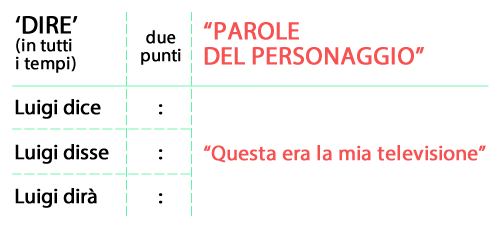DIRECT SPEECH is used to report words exactly as they were written or said. Punctuation marks (') and the colon (:) are used to tell where it is. For example, you can say the following. Mio padre dice sempre: 'pensa a quello che fai!'.
When one person (called a NARRATORE) writes what another person (called a PERSONAGGIO) says, direct speech may be used. The structure of this speech is formed by the: VERBO DIRE (:) 'PAROLE DEL PERSONAGGIO'. The 'words of the character' are in quotation marks (") or ('). Here is the diagram that clarifies this structure. In this case 'Luigi' is the 'personaggio':

This dictionary includes the 2000 words of the LESSICO FONDAMENTALE of the Italian language. You can search by word, or by category
|
|
|
|
|
|
|
|
When you are in your AREA RISERVATA, you will be able to download exercises similar to the one below
Trial exercise